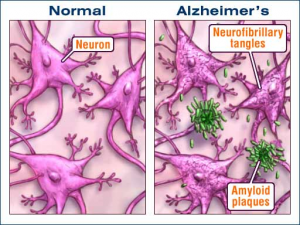Alzheimer’s disease (AD) is one of the most dreaded neurological disorders. Characterized by severe memory loss and cognitive declined, Alzheimer’s is relatively easy to distinguish from other disorders in its later stages, but it is more difficult to detect early on. Given the lack of effective treatment options for late stage Alzheimer’s disease, it’s crucial to diagnose AD before symptoms become severe.
Although the ultimate cause of Alzheimer’s is unknown, several neurological abnormalities are associated with the onset of the disease. Beta-amyloid plaques, formed by the accumulation of improperly folded amyloid proteins, disrupt synaptic connectivity and neural plasticity (1). Accumulation of these plaques is correlated with the over-activation of a signaling pathway known as the P13-kinase/Akt pathway, which is regulated by insulin and insulin-like growth factors (1).


Inflammation is also thought to play a role in the onset of Alzheimer’s disease by disrupting the structural integrity of synapses between neurons (1).
Another protein, called “Tau,” is responsible for holding other proteins, called microtubules, together outside of the cell. These microtubules help connect neurons to each other (2). In individuals with Alzheimer’s, Tau is dissociated from these microtubules and forms tangles within neurons, and it no longer holds the microtubules together, resulting with disruptions in neuronal connectivity (2).

These abnormalities are often present long before symptoms become severe enough to cause some individuals to seek a diagnosis, and the accumulation of Beta-amyloid plaques and Tau tangles are practically irreversible. Therefore it’s important to detect Alzheimer’s early on in order to slow the progression of the disease and to maintain the best quality of life possible. Here are early signs and symptoms of Alzheimer’s disease that elderly individuals and their family members should be mindful of:
- Short-term memory problems, like forgetting recently made appointments.
- Lapses or mistakes in long-term memory, such as forgetting important dates (like birthdays or anniversaries), or forgetting the names of familiar people.
- Difficulties with keeping track of information, such as bills.
- Difficulties with concentration and attention.
- Getting confused with time or places. An example would be forgetting which season it currently is.
- Visual problems, such as problems with depth perception or the inability to determine color.
- Problems with speech and writing, like stopping in the middle of a sentence or calling objects by the wrong name.
- Changes in mood.
- Decrease in the ability to make sound judgments, such as falling for scams that would usually be easy to identify as malicious.
- Social withdrawal.
This list was compiled from information given by the Alzheimer’s Association, and can be accessed by the following link: https://www.alz.org/10-signs-symptoms-alzheimers-dementia.asp
While Alzheimer’s is difficult to treat at any stage, treatments are much more effective early on, before symptoms become severe. Unfortunately it is often difficult to distinguish some of the early symptoms from the normal cognitive changes that occur with age, which means it’s imperative for elderly individuals to seek advice from medical professionals if more than one of these symptoms become apparent.
Sources
1.https://moodle.cord.edu/pluginfile.php/625272/mod_resource/content/0/AD%20and%20insulin%20signaling.pdf
- https://www.ncbi.nlm.nih.gov/pmc/articles/PMC3385935/
- https://www.alz.org/10-signs-symptoms-alzheimers-dementia.asp
Image Credits
1. https://www.everydayhealth.com/news/10-essential-facts-about-alzheimers-disease/
2. http://www.namrata.co/case-study-alzheimer-disease/amyloid-plaques-and-neuro-fibrillary-tangles/
3. https://alzheimersnewstoday.com/2014/11/03/tau-protein-leads-to-neuronal-death-in-alzheimers/
